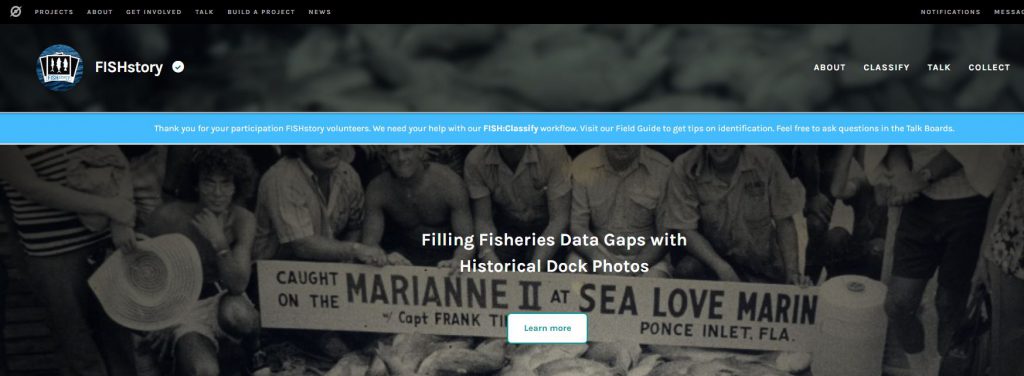by Marcus Boston Jr. | Apr 13, 2023
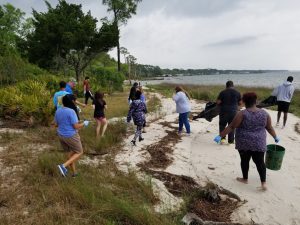 Life skills for youth are defined as a set of abilities and competencies that enable young people to successfully navigate their daily lives and achieve their goals. These skills are essential for personal and professional development and help “prepare youth to be responsible citizens and productive members of the workforce.” Florida 4-H provides many opportunities for young people to obtain life skills through project work, community and afterschool clubs, workshops, and leadership programs.
Life skills for youth are defined as a set of abilities and competencies that enable young people to successfully navigate their daily lives and achieve their goals. These skills are essential for personal and professional development and help “prepare youth to be responsible citizens and productive members of the workforce.” Florida 4-H provides many opportunities for young people to obtain life skills through project work, community and afterschool clubs, workshops, and leadership programs.
As a state-wide organization, Florida 4-H prioritizes the development of communication, higher-order thinking, and appreciation of differences. These three life skills are infused throughout our educational activities and programs because they are essential workforce skills. Below are a few examples of local programs that focus on helping youth develop life skills:
- Communication: 4-H provides opportunities for youth to develop their communication skills through the Florida 4-H Public Speaking Contest, demonstrations, and presentations at County/District and 4-H University. These activities help youth learn how to articulate their ideas clearly and confidently.
- Higher Order Thinking: this includes both decision-making and problem-solving.
- Decision-Making: 4-H offers various programs, such as judging contests at fairs, 4-H event planning committees (district/state council), and club activities that help youth develop their decision-making skills. These activities help youth learn how to make informed decisions and evaluate the outcomes of their choices.
- Problem-Solving: 4-H offers various programs, such as STEM projects and engineering challenges, that help youth develop problem-solving skills. These activities encourage youth to think creatively and find innovative solutions to complex problems.
- Appreciation of Differences– 4-H helps youth learn how to respect and communicate with people who might be different from themselves. Many of our programs offer opportunities for youth to meet new people and explore different cultures. We also help youth learn how to address conflict in a positive way through civil discourse. Older youth can participate in exchange programs with 4-Hers from other states and countries (4-H is in all 50 states and 32 other countries!).
- Teamwork: Through 4-H club projects, counselor training, and community service activities, youth learn how to work collaboratively with others towards a common goal, which helps them develop important teamwork skills.
- Responsibility: 4-H club projects and community service activities encourage youth to take responsibility for their actions and to learn the importance of following through on commitments.
- Leadership Development: 4-H offers various programs, such as officer training, public speaking, county/district councils, and community service projects, that help youth develop their leadership skills.
- Self-Confidence: 4-H programs provide a safe and supportive environment where youth can build their self-confidence through public speaking, leadership roles, and community service activities.
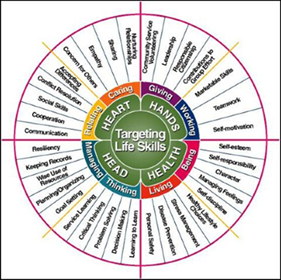
- Service Learning: Through 4-H club work, obtaining a Florida 4-H Community Pride Grant, and active membership on county/district councils, youth members take part in projects and experiences that help them how to become active participants in the communities and apply their experiences to real-life situations.
These are not the only life skills youth in Florida can learn and practice through 4-H- but they are part of almost every program we offer. These are examples of the priority life skills that Florida 4-H promotes among youth, with a focus on cognitive development, interpersonal skills, leadership, civic engagement, and practical skills. Florida 4-H aims to provide a comprehensive youth development program that equips young people with the skills they need to succeed in their personal lives, careers, and communities. Active involvement in 4-H will help members to connect life skills obtained through their 4-H involvement to real-life experiences. For more information on these youth leadership opportunities please contact your local 4-H office.
If you would like to help Florida 4-H teach life skills, or get your child involved in our program, reach out to your local UF/IFAS County Extension Office. There is an office in every county in Florida. Spring is a great time to get involved, because 4-H offers several summer programs for youth to develop life skills!
References:
Marilyn N. Norman and Joy C. Jordan.2018.Targeting Life Skills. EDIS document #4HSFS101.9
Hendricks, P.(1988). Developing Youth Curriculum Using The targeting Life Skills Model
Michigan State Extension. 2016. 4-H Head Life Skill Sheets.(4-H1679)
by Marie Arick | Feb 18, 2022
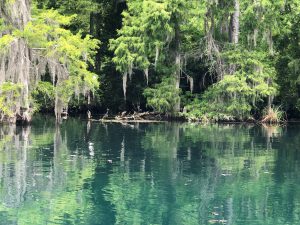
Mill Pond, Marianna, Fl. Photo credit Marie Arick
Grab your favorite soft cotton sweatshirt, jeans and those nice leather sneakers or boots … these all require agriculture! Kayaking in your favorite spring? Springs are considered a part of agriculture, labeled as a natural resource and are managed by the Florida Department of Environmental Protection.
Agriculture touches our lives daily. It would be quite impossible to navigate our world without the assistance of agriculture. Timber farms produce the lumber to build homes and make paper, cotton is used not only for clothing, but also in the creation of our paper monies. And we have not even discussed the foods we eat, and numerous other products created utilizing agricultural products.
Agricultural insight into the production and management of agricultural resources is why we in Extension promote and teach Ag Literacy. It is this basic knowledge that celebrates those who work hard daily to not only produce items to be consumed, but also manage those agricultural resources not only on the farm, but also our forests and waterways. This management can even rely on public policies for protection of these resources to ensure proper usage for generations to come.
Still not convinced? Did you wash your hair this morning and brush your teeth? Thank a farmer. Agricultural and the related industries contributed more than $1.1 trillion to the gross domestic product of the United States in 2019 and also provided 19.7 million jobs in 2020 per the U.S. Department of Agriculture. That is a small insight into how much agriculture impacts your life every day.
Everyone is dependent on agriculture in numerous forms each day. Celebrating Ag Literacy Day is a great way to expand your agricultural insight and awareness. Look around and appreciate the beauty of our land and waterways. Explore agriculture and all the ways to be a good steward of these natural resources, after all we all depend on them every day.
by Marcus Boston Jr. | Feb 4, 2022
My name is Marcus Boston and I’m the County Extension Director and 4-H Youth Development Agent in Leon County, Tallahassee FL. I’m originally from Gainesville Florida and have worked for the Leon County Extension Service as a 4-H Extension Agent, for 29 years.
I was born and raised in Gainesville FL., the location of the State 4-H office but was never involved in 4-H as a youth. I graduated from Buchholz High School in Gainesville Florida and earned a football scholarship to attend school and play football for Florida A&M University (FAMU) in Tallahassee. As a result of my accomplishments on and off the team, during my senior year, I was awarded the prestigious Alonzo Smith “Jake Gaither” Award. I completed my B.S. degree in Agribusiness and while working as a graduate assistant coach on the football team, I completed my M.S. in Agricultural Sciences. Prior to starting graduate school, I worked as a Sideline Commentator for the Florida A&M football games that were aired on a local radio station. After completing graduate school, I began my professional career as an extension agent with Florida A&M University and the University of Florida working primarily with 4-H Youth Development.
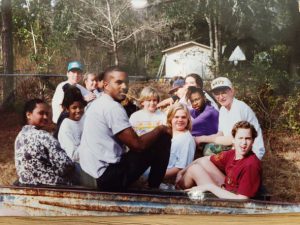
Marcus joins Leon County 4-H Leadership Club fun day activity in the early 90’s
When I started in Leon County one of my first assignments was to make a personal visit to all the existing 4-H clubs in the county at that time. After meeting all the wonderful volunteers and youth involved in our Leon County 4-H program, I was inspired by all the fun educational projects the youth were involved in and encouraged by the commitment and passion of the volunteers that oversaw the clubs. It is this commitment and passion that still exist today and that encouraged me to work extra hard to recruit and train volunteers so there could be more clubs for youth to join.
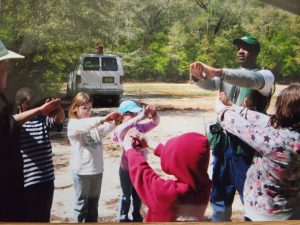
Marcus Boston teaching youth how to determine which eye is dominant before archery class
The establishment of my Environmental Education/Stewardship Program is one of my most successful programs here in Leon County. This program includes a series of smaller programs developed and carried out with the primary objective of educating our youth about the importance of conserving, protecting, and appreciating our environment and how they can become environmental stewards in their respective community’s. These experiences are tailored to equip youth participants with the information they need that will help them make logical decisions on environmental issues that may arise as they enter adulthood. In a few years these youth could be accountable for attitudes, perceptions and policies that affect our environment as well as our soil. A few of the environmental focused experiences that I developed and carried out during past several years as part of our Leon County 4-H program are: 4-H Ecology Field Day, 4-H Eco-ventures Spring Break Camp, Wild About Water Day Camp, The Talking Trash Day Camp, Going Green Day Camp, No Woods Left Behind Day Camp, Trees and Bows Day Camp, 4-H Wildlife and Outdoor Recreation Camp at Jubilee, and residential camp at 4-H Camp Cherry Lake held in Madison FL.
As a certified archery and canoe instructor, I’ve had the pleasure of teaching thousands of youth communications and safety skills using a canoe and a bow and arrow as the vehicle of choice. Both of which I’m still involved to this day. In an effort help young people learn the life cycle, I have taught the 4-H Embryology program in several schools in Leon County. This program has provided the opportunity for hundreds of students and teachers, to watch chicks hatch out of their eggs right before their eyes in their classroom…an experience they never forget.
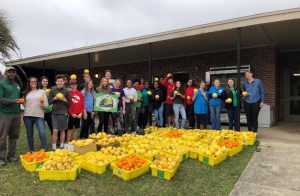
Leon County 4-H Camp Counselors kickoff counselor training with gleaning 1,300 lbs. of fruit to provide for homeless shelter
The Leon County 4-H Camp Counselor Training Program has also served as one of my most successful teen leadership programs. I have enjoyed recruiting, training and equipping hundreds of teens with the skills and knowledge they need to: Manage campers at our residential camp, understand the “ages and stages” of the youth they supervised, apply strategies for teaching classes at camp, and most important, keeping camp safe for all in attendance. Due to the success of this program, former counselors from our counselor training program are viewed and recruited as potential camp staff for our State 4-H camps each year.
I have also enjoyed providing opportunities for thousands of youth in Leon County Schools to participate in The 4-H Tropicana Public Speaking Program (now known as the Florida 4-H Public Speaking Program sponsored by Florida Power and Light) which annually provides an opportunity for over 7,000 Leon County 4th, 5th, and 6th graders to develop, write, and present a speech on a topic of their interest. With so much emphasis on texting and posting…this program continues to provide a platform for young people to develop their oral communication skills which is crucial as they graduate and enter the work force.
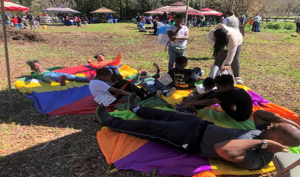
Marcus Boston is demonstrating fitness techniques with attendees during Youth Extension Day in Leon County.
I have also been a Project Learning Tree(PLT) facilitator for over 20 years and have help to train over 500 college students from Florida State, Flagler College and Florida A&M University in how to teach youth environmental education using the PLT curriculum.
The last six years as County Extension Director has provided me an opportunity to promote UF/IFAS Extension by managing and working with my faculty in providing researched based information in the form of workshops, field days, 4-H clubs, seminars, virtual and hybrid webinars and school enrichment programs in an effort to help youth and adults in the Leon County Community find the Solutions For Their Life. I have always believed that active participation in 4-H provides youth the tools in life to be successful in whatever direction they choose to go.
by Ronnie Cowan | Jun 17, 2021
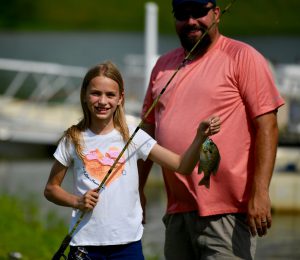 If you need a good reason to go fishing, we’ve got you! Today is National Take a Kid Fishing Day, and we can’t think of a better reason to promote our 4-H fishing project. Our 4-H fishing project connects youth to the great outdoors and is an opportunity for youth to learn about:
If you need a good reason to go fishing, we’ve got you! Today is National Take a Kid Fishing Day, and we can’t think of a better reason to promote our 4-H fishing project. Our 4-H fishing project connects youth to the great outdoors and is an opportunity for youth to learn about:
- Important angling skills, like casting and retrieving your line.
- Different types of tackle and how they are used to catch fish.
- How to take proper care of your rod and reel.
- Cleaning and cooking your fish.
- Ecology of aquatic and marine environments.
- How to identify the different types of sportfish and how to catch them.
- What it means to be a responsible angler.
Youth also learn about careers related to fisheries and wildlife, and their importance to the Florida economy. Florida is often called the fishing capitol of the world because the state holds more record fish catches than any other state or country! Fishing is important for many different reasons. Recreational fishing is a major economical driver in the state of Florida. The sunshine state has approximately 4 million anglers that contribute $13.8 billion to Florida’s economy supporting over 120,000 local jobs.
If you have a passion for fishing and the environment, please consider sharing your skills and knowledge with youth. 4-H can customize volunteer roles to fit your interest and
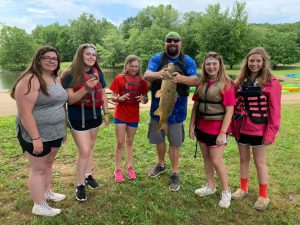
Group of 4-H youth, volunteers, and agent enjoying the wonders of the outdoors
schedule so you can inspire the next generation of anglers. Contact your local UF IFAS Extension office to discuss how you can contribute to “making the best better” in your community.
If your child or grandchild is interested in participating in our fishing program, check out our Sports Fishing Project page, or reach out to your local 4-H agent. The University of Florida school of Forestry, Fisheries, and Geomatic Sciences sponsors a program called “Fishing for Success.” This program includes several family fishing days where they provide everything you need to fish and have fun!
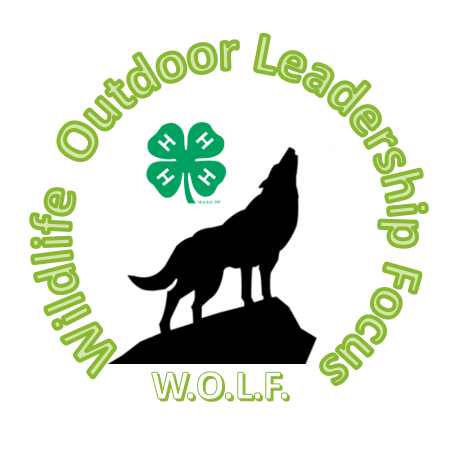
by Ronnie Cowan | Aug 14, 2020
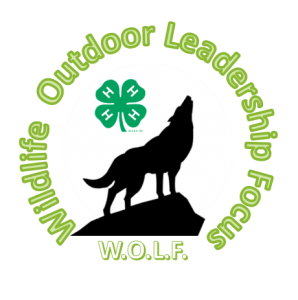
Environmental education can be a very broad topic. The study of how living organisms interact within their environment can be very complicated, especially when we factor in the human element. An Okaloosa County 4-H program Called Wildlife Outdoor Leadership Focus or (W.O.L.F.) was created to address the human dimension of natural resources. Basically, this is a youth conservation program dedicated to making participants aware of the importance of natural resources recreation and to apply the art and science of natural resource management. W.O.L.F. has three main objectives.
Objective 1 – Learn the Importance of Natural Resources
The W.O.L.F. program starts by explaining why these natural resources are important. For example, outdoor activities such as hunting, fishing, boating and wildlife viewing contribute over $25 BILLION to the state of Florida. People are very passionate about their outdoor activities. Florida hunters average nearly $3,000 per person on hunting expenditures per year! Our state has a vast stakeholder interest. Nearly 6 million people participate in wildlife/fisheries activities every year in Florida. The L in W.O.L.F. stands for leadership. Local, state, and federal leaders make important decisions every year regarding natural resource management. Teddy Roosevelt, our 26th President of the United States, established 230 million acres of public land for all to enjoy. Government still protects many of our natural resources today. Florida is home to 175 state parks.
Objective 2 – Apply Theory and Practice Conservation
W.O.L.F. participants receive hands on practice of being a conservationist. The program teaches 4-H members the science and art behind wildlife management. Florida 4-H has a virtual Wildlife Outdoor Leadership Focus (W.O.L.F.) Day Camp were youth can learn at their own pace. The camp has 5 sections: Woods and Fields, Freshwater, Saltwater, Survival, and Biologist life. Each day has videos and activities that offer a daily challenge. W.O.L.F. campers learn about wildlife/plant identification, and what specific wildlife species need to survive. Furthermore, we show youth how our actions, intentional or unintentional, affect the environment we live in. The virtual day camp also covers basic biology of mammals, birds, fish, and reptile. Participants are encouraged to go out with adult supervision and see what’s going on in the great outdoors.
The final activity is the wildlife challenge where campers must be a wildlife biologist for a day. 4-H members are given a scenario with three wildlife species that the landowner wants to manage on a piece of property. The camper must evaluate the property based on the requirements that the 3 wildlife species need in order to survive. The camper completes a wildlife management plan. They look at the best management practices given to them during the course and decide if the property is a habitat for the desired wildlife species. If it is not, they must offer a solution. For example, the landowner wishes to have more northern bobwhite quail on the property but the land is covered in mature hardwoods. The campers are expected to make a recommendation. They learned that quail need shrubs, native grasses, and forbs.
Objective 3 – Career Development and Multi-Science Approach
The W.O.L.F. program also sparks awareness about the professionals who work with our natural resources. Participants virtually meet biologists, wildlife officers, and other natural resource professionals. Each career video will explain how they help our environment. Campers will get to see what it would be like if they had their jobs.
Let 4-H introduce you or your youth to the Wildlife Outdoor Leadership Focus (W.O.L.F.) program. The program does not just stop with wildlife and fisheries science careers. The program explains many more sciences. 4-H members will learn about soil science, forestry, engineering, math, agriculture, and technology to name a few. The only thing your youth will need is a love for the outdoors. If you are interested in W.O.L.F. Camp, please reach out to your local UF/ IFAS County Extension 4-H Agent. The W.O.L.F. program will also be available as a virtual project in Okaloosa County.
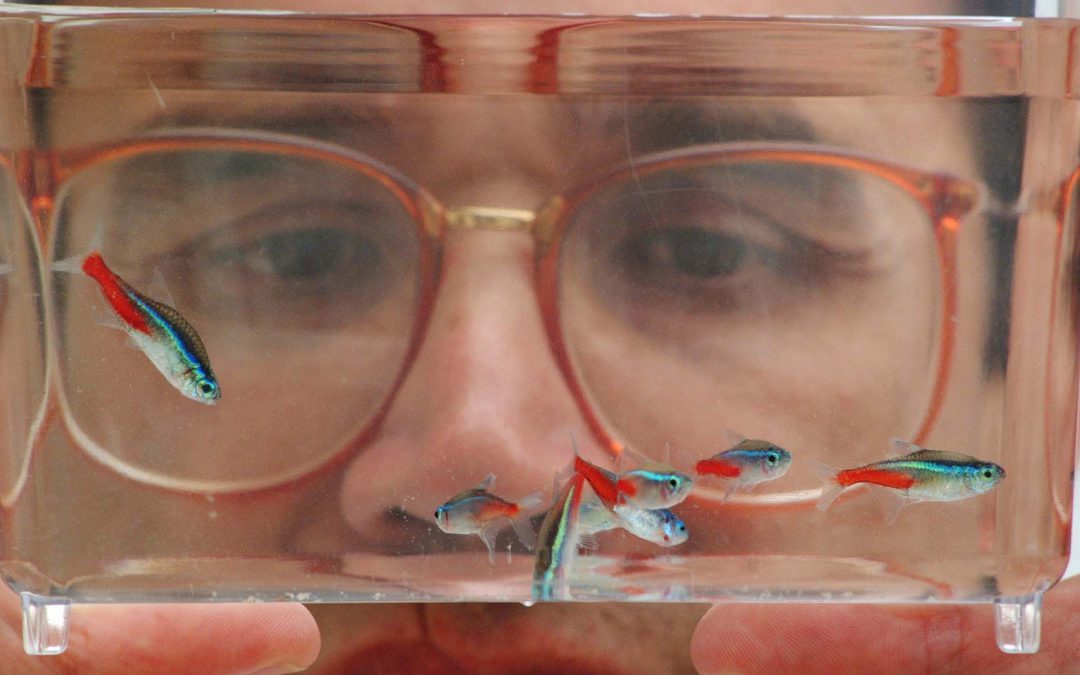
by pmdavis | Aug 7, 2020
4-H members and volunteers are always seeking new ideas for hands-on learning experiences as service activities to positively impact our communities. With covid-19, some community service opportunities have been limited due to social distancing and other restrictions. However, the South Atlantic Fishery Management Council and Florida Sea Grant have a new opportunity for 4-H members to get involved virtually. This opportunity is a citizen science project that would be a great way to build your community service hours and learn something new about fish in the process!
Are any of you into history, helping with research, and like fish? If you answered “yes” to any of these, please consider working with the FISHstory Project! The South Atlantic Fishery Management Council and Florida Sea Grant needs help with a citizen science project to help fill gaps in fisheries data using historical dock photos.
Who can participate? Families and youth ages 16+, or younger youth with an adult mentor who is working with them for the sessions. If you are under the age of 16, you will need your parent to register with you. It is a very simple registration process. First, register for FISHstory at https://scistarter.org/fishstory. Then, click on the https://safmc.net/safmc-fishstory/ link to begin helping count and identify fish in the historical photos.
This project will train you as a citizen scientist to identify and count fish using historic fishing photos from the 1940-1970s, prior to when dedicated catch monitoring began. This is a two-part project. The first part is to simply count the number of fish in the photo. The second part is to identify the fish in the photo. Everything is done online using Zooniverse, so there would be no travel or cost to participate in this project.
Data collected with your help will provide a picture of the fishery in the earlier years. This will help scientists understand the fishing industry prior to dedicated monitoring programs. It will also help improve our understanding of the fishing of several iconic species over the years. This data will be used to help accurately estimate stock productivity from 1940 to 1970 when for-hire fisheries off the Atlantic coast of Florida were gaining popularity. Your help is needed to fill these data gaps to help evaluate assumptions about stock productivity. The historic photos, untapped sources of this important biological data, can help do just that. Analyzing the photos will help provide better information of what people were catching during this time period, seasonality of their catches, and possibly estimate a rough catch per angler, which can provide insights on the health of fish populations during that period.
4-H helps youth to learn the skills needed to lead the positive change in their communities like this one. This is done through hands-on learning opportunities that explore citizenship, community development, and personal growth. For more information on community service projects or other 4-H programs that build essential life skills in youth, please contact your local UF IFAS County Extension Office, or visit http://florida4h.org.
 Life skills for youth are defined as a set of abilities and competencies that enable young people to successfully navigate their daily lives and achieve their goals. These skills are essential for personal and professional development and help “prepare youth to be responsible citizens and productive members of the workforce.” Florida 4-H provides many opportunities for young people to obtain life skills through project work, community and afterschool clubs, workshops, and leadership programs.
Life skills for youth are defined as a set of abilities and competencies that enable young people to successfully navigate their daily lives and achieve their goals. These skills are essential for personal and professional development and help “prepare youth to be responsible citizens and productive members of the workforce.” Florida 4-H provides many opportunities for young people to obtain life skills through project work, community and afterschool clubs, workshops, and leadership programs.











